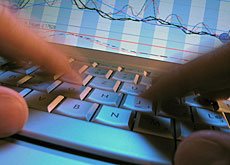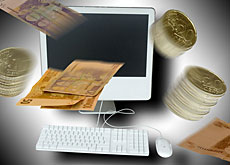“Rational” investors take control of assets

More private investors are choosing to take control of their own trading rather than run the risk of professionals losing their assets in the current financial turmoil.
But while more people are opening personal online trading accounts than ever before, most are playing safe with their money rather than attempting to play the markets for short-term profit.
Switzerland’s leading online broker, Swissquote, opened 25,000 new accounts last year and expects the same number this year having already attracted more than 100,000 customers. Competitor Trade-net.ch has seen a 50 per cent growth in subscribers so far in 2008.
Swissquote chief executive Marc Bürki told swissinfo that clients are losing confidence in professional asset managers as the financial crisis continues.
“People want to gain control over their holdings. In these shaky times they want to make their own decisions, press the button and have total control over their assets,” he said.
Bürki added that the volume of transactions was also increasing dramatically with most clients opting for the safe havens of cash or government bonds. However, some investors are starting to buy shares again following dramatic stock market falls while a few speculators are willing to gamble on day-to-day changes in prices.
Chaotic yet rational
Plunging stock markets have witnessed short-lived rallies followed by yet more losses in the last few weeks as governments announced rescue packages. But one expert dismissed suggestions of irrational investor behaviour.
Professor Peter Bossaerts, at the Federal Institute of Technology’s Swiss Finance Institute in Lausanne, told swissinfo that the volatility made perfect sense.
“We are not seeing any more irrational behaviour than we normally see even if it all seems very chaotic at the moment,” he said. “Everybody thinks this is panic, but on the contrary, it is very rational.”
“The irrationality already happened during the previous period of euphoria, but people are realising that their decisions made no sense. Once people started asking what mortgage-backed securities were worth they became more rational about their decisions.”
Professor Stewart Hamilton of the IMD international business school in Lausanne warned inexperienced investors not to get sucked into gambling on short-term changes in the markets – an activity known as day trading.
“There was a huge amount of day trading going on during the dotcom crash in the late 1990s and a lot of people lost their shirts,” he told swissinfo. “It is bad enough when you are investing your own money but if you are borrowing money to be a day trader it is a sure-fire recipe for disaster.”
Losers essential
However, Bossaerts believes the market needs a small number of losers in order to operate efficiently.
“If you only have two expert poker players then they won’t want to play against each other, but if there is a third guy who does not know what they are doing then the game is on,” he said.
“It is essential to have irrational traders. If we can get the whole party to continue with the presence of a few people who make misguided steps then it helps everyone.”
swissinfo, Matthew Allen in Zurich
A University of Zurich study has revealed that fewer Swiss are investing their money in shares than they did at the turn of the century.
The study showed that 20% of the population holds shares (1.7% in the companies they work for) – around the same number as in 2004.
However, the proportion of shareholders has dropped dramatically from 2000 when around a third of the population owned company stock.
The proportion of people aged under 40 who own shares has shrunk more than 5%, but more over-50s invest their money in this way. This older age group currently represents half of the shareholders in Switzerland.
The proportion of shareholders varies according to geographical location: 20.9% in the German-speaking part of Switzerland, 12.8% of French speakers and only 6.5% in the Italian region.
Around three quarters of Swiss who buy shares take stakes in Swiss companies while half of all shareholders only invest in homeland firms.

In compliance with the JTI standards
More: SWI swissinfo.ch certified by the Journalism Trust Initiative



You can find an overview of ongoing debates with our journalists here . Please join us!
If you want to start a conversation about a topic raised in this article or want to report factual errors, email us at english@swissinfo.ch.